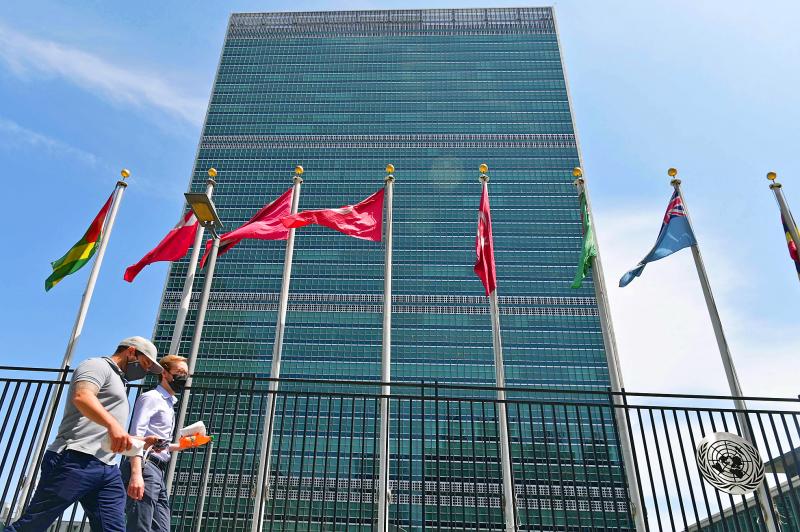Beijing has inaccurately interpreted a UN resolution adopted in 1971 to exclude Taiwan from the international organization and its affiliates, a US Department of State official said on Thursday.
“The People’s Republic of China [PRC] has misused Resolution 2758 to prevent Taiwan’s meaningful participation,” said Rick Waters, deputy assistant secretary of state in the department’s Bureau of East Asia and Pacific Affairs, during a virtual talk hosted by the Washington-based German Marshall Fund.
Waters said that Taiwan’s exclusion from UN activities “creates an immense cost” to the nation, as well as the bloc’s members, adding that “Beijing is denying the international community the ability to gain valuable contributions that Taiwan offers.”

Photo: AFP
In the resolution adopted on Oct. 25, 1971, the UN General Assembly decided to “expel forthwith the representatives of Chiang Kai-shek (蔣介石) from the place which they unlawfully occupy at the United Nations and in all the organizations related to it.”
In Taipei, the Ministry of Foreign Affairs thanked the US for firmly supporting Taiwan’s bid to join UN organizations.
“The Republic of China is a democratic country with independent sovereignty,” the ministry said in a statement, adding that the nation and the PRC are not subordinate to each other.
Only an elected government in Taiwan can represent its 23.5 million people on international occasions, including the UN, the ministry said.
The resolution only addressed the PRC’s representation in the UN without authorizing it to represent Taiwan, nor did it mention that Taiwan is part of the PRC, it said.
The PRC has been intentionally abusing the resolution to pressure the UN into excluding Taiwanese from its system, it added.
The ministry denounced Beijing prioritizing its political maneuvers over the interests of global cooperation, while calling on international society to face China’s “overt plot” against Taiwan.
The government would continue to bolster its cooperation with the US and other like-minded countries to expand Taiwan’s international space, and defend the shared values of democracy, freedom and a rules-based international order, the ministry said.
Democratic Progressive Party Legislator Lo Chih-cheng (羅致政) said that support from a high-ranking US official would benefit Taiwan’s UN bid, either in terms of aiding its appeal or gaining the moral high ground.
Chinese Nationalist Party (KMT) Legislator Charles Chen (陳以信) said that under former president Ma Ying-jeou’s (馬英九) administration, Taiwan participated as an observer at the World Health Assembly — the WHO’s decisionmaking body — for eight years.
It shows the nation could make a breakthrough by endorsing the so-called “1992 consensus,” he said, adding that rejoining the UN under the name the Republic of China should be a priority.
The “1992 consensus” — a term that former Mainland Affairs Council chairman Su Chi (蘇起) in 2006 admitted making up in 2000 — refers to a tacit understanding between the KMT and the Chinese government that both sides of the Taiwan Strait acknowledge there is “one China,” with each side having its own interpretation of what “China” means.

CHAOS: Iranians took to the streets playing celebratory music after reports of Khamenei’s death on Saturday, while mourners also gathered in Tehran yesterday Iranian Supreme Leader Ayatollah Ali Khamenei was killed in a major attack on Iran launched by Israel and the US, throwing the future of the Islamic republic into doubt and raising the risk of regional instability. Iranian state television and the state-run IRNA news agency announced the 86-year-old’s death early yesterday. US President Donald Trump said it gave Iranians their “greatest chance” to “take back” their country. The announcements came after a joint US and Israeli aerial bombardment that targeted Iranian military and governmental sites. Trump said the “heavy and pinpoint bombing” would continue through the week or as long

TRUST: The KMT said it respected the US’ timing and considerations, and hoped it would continue to honor its commitments to helping Taiwan bolster its defenses and deterrence US President Donald Trump is delaying a multibillion-dollar arms sale to Taiwan to ensure his visit to Beijing is successful, a New York Times report said. The weapons sales package has stalled in the US Department of State, the report said, citing US officials it did not identify. The White House has told agencies not to push forward ahead of Trump’s meeting with Chinese President Xi Jinping (習近平), it said. The two last month held a phone call to discuss trade and geopolitical flashpoints ahead of the summit. Xi raised the Taiwan issue and urged the US to handle arms sales to

State-run CPC Corp, Taiwan (CPC, 台灣中油) yesterday said that it had confirmed on Saturday night with its liquefied natural gas (LNG) and crude oil suppliers that shipments are proceeding as scheduled and that domestic supplies remain unaffected. The CPC yesterday announced the gasoline and diesel prices will rise by NT$0.2 and NT$0.4 per liter, respectively, starting Monday, citing Middle East tensions and blizzards in the eastern United States. CPC also iterated it has been reducing the proportion of crude oil imports from the Middle East and diversifying its supply sources in the past few years in response to geopolitical risks, expanding

Pro-democracy media tycoon Jimmy Lai’s (黎智英) fraud conviction and prison sentence were yesterday overturned by a Hong Kong court, in a surprise legal decision that comes soon after Lai was jailed for 20 years on a separate national security charge. Judges Jeremy Poon (潘兆初), Anthea Pang (彭寶琴) and Derek Pang (彭偉昌) said in the judgement that they allowed the appeal from Lai, and another defendant in the case, to proceed, as a lower court judge had “erred.” “The Court of Appeal gave them leave to appeal against their conviction, allowed their appeals, quashed the convictions and set aside the sentences,” the judges